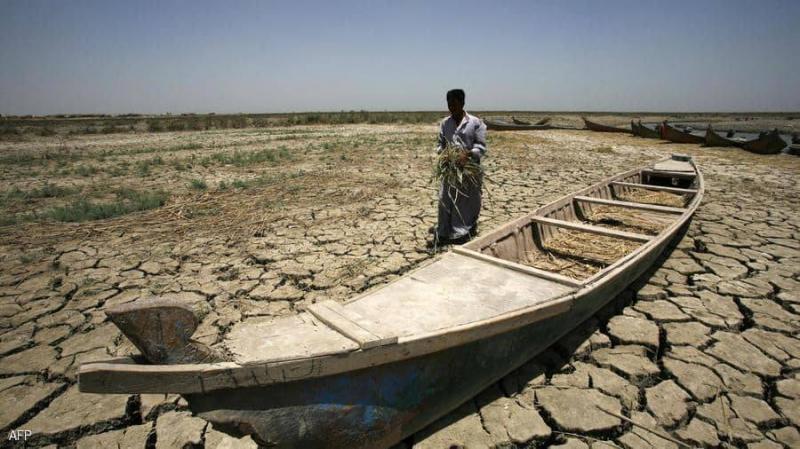Iraq is gradually losing water, which is its most prominent weapon to combat the effects of climate change, due to both natural causes and actions from neighboring countries. Iraq ranks fifth in the list of countries most affected by climate change, with expectations that the country's suffering from this phenomenon will intensify in the foreseeable future. The United Nations Environment Programme states that the economic, environmental, and health impacts resulting from climate transformations represent the deadliest threats Iraq faces.
**Manifestations of Climate Change in Iraq**
According to experts, climate change in Iraq is evident through unprecedented increases in temperatures, accompanied by desertification and a reduction in arable land, as well as more intense dust and sandstorms than before. Official figures indicate that desertification now affects 39% of Iraqi land, while increasing soil salinity threatens the agricultural sector in 54% of cultivated land. Environmental experts point out that water policies detrimental to Mesopotamia from neighboring countries, through the construction of dams on the sources of the Tigris and Euphrates rivers, exacerbate the climate change crisis. Over time, these policies have reduced the flow of water to Iraqi territories, leading to significant shortages in irrigation water supplies.
**A Crucial Weapon Almost Lost**
Hamza Ramadan, director of the Water and Energy Strategies Center, stated to Sky News Arabia: "Water abundance is the cornerstone of projects to combat desertification, drought, and the consequences of climate change, while Iraq suffers from severe water scarcity that has reached alarming levels." Ramadan believes that without ensuring fair water quotas for Iraq from the Tigris and Euphrates, the country cannot combat climate change. He noted that due to the policies of Turkey and Iran, which have led to water scarcity, Iraq has been compelled to cut its agricultural areas in half. He added that the Ministries of Water Resources and Agriculture have agreed to reduce cultivated areas by half and exclude the entire Diyala Governorate from the winter agricultural plan, aligning with Iran’s claims that Iraq does not need water to irrigate its lands.
The Iraqi expert views the water situation in his country as catastrophic, facing an annual water shortfall of approximately 11 billion cubic meters due to declining water levels in the Tigris and Euphrates. With the demographic increase—expected to reach 80 million by 2050—Ramadan says: "We do not see any sustainable development plans that meet and anticipate this immense population increase." He added, "With the ongoing technological advancements worldwide, many alternatives to oil will be found, which will reduce global demand for it, a resource that Iraq's budget heavily depends on, which is a rental budget relying on oil without any consideration for agriculture, industry, and other vital and renewable production fields." The Iraqi academic continues: "Desertification is engulfing nearly half of Iraq, covering about 40% of the country's area, and the desertification zone expands annually due to reduced rainfall and irrigation water scarcity, leading to soil degradation and increased salinity. Therefore, the reality on the ground is entirely catastrophic, and addressing and alleviating this crisis, or rather disaster, is an extremely difficult task."
**Declining Rainfall**
On his part, Iraqi geological expert Ali Ismail stated to Sky News Arabia: "Climate change is one of the main challenges facing the entire world, not just Iraq, and it manifests through unprecedented long-term changes in temperatures and weather on Earth, requiring utmost seriousness and attention." Ismail added that the main repercussions of climate change include "the decrease in rainfall, which directly impacts the increasing frequency of drought and desertification that has invaded vast areas in Iraq and the Middle East, which undoubtedly has extremely negative and dangerous implications for human life and health, due to the resulting scarcity and waste of resources, consequently leading to exacerbated famine and reduced food and water supplies." The Iraqi academic concludes: "What is required from Iraq and various countries, especially those most affected by climate change phenomena, is to seriously address this existential crisis and form specialized teams to study the reality and outline ways and means of addressing the issues that can be adopted, which should align with the latest global technologies, particularly clean and renewable energy alternatives."




